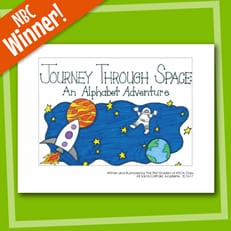 As much as we know about space from Hubble photography and multiple space missions, so much is a complete mystery! From black holes to possible alien life, there’s endless material to fire up the imagination. That makes a writing exercise about space a unique opportunity for elementary students to combine their creativity with research skills. The sky’s the limit with these class book project ideas about space and science!
As much as we know about space from Hubble photography and multiple space missions, so much is a complete mystery! From black holes to possible alien life, there’s endless material to fire up the imagination. That makes a writing exercise about space a unique opportunity for elementary students to combine their creativity with research skills. The sky’s the limit with these class book project ideas about space and science!
Build Your Class Book With These 3 Class Book Project Ideas About Space and Science
Make the most of your science lessons about space by putting together a project for your students using these writing prompts. Students can explore the furthest reaches of their imaginations through narrative and descriptive writing, while keeping their feet on the ground with scientific facts about the planets, stars, asteroids and gravity.
In addition to practicing writing, a project like this presents the perfect opportunity to create a memorable classbook about space. If you take the writing exercises and include student drawings and illustrations, you have what you need to create an out-of-this-world classbook!
Writing Prompt #1: You’re an alien who is visiting Earth. Write a letter to your alien friends describing what you see.
Students can flex their descriptive writing skills in describing their alien and all the sights, smells and sounds, plus their narrative writing skills in telling the exciting story of their visit to Earth.
For first and second graders, encourage them to describe their home or school through the eyes of the alien. What things do we do that might be funny or weird to someone from another planet? What kinds of animals would the alien see? Would they look different from animals on the alien’s planet? Would they like the food, or would it just be…icky? For older students with a wider view of the world, they might pick their city or a famous landmark.
This writing exercise is a great opportunity for third through sixth graders to work on characterization in their creative writing. From friendly aliens in “Lilo & Stitch” and “E.T.” to decidedly unfriendly aliens in, well, “Alien,” there are so many different ways of portraying visitors from other planets! Encourage your students to decide…is the alien friendly or unfriendly? What does the alien think of humans?
Fifth and sixth graders can really work on their research skills along with their imaginations for this writing prompt. Have your students pick out and research a specific planet or moon in the solar system that their alien is from. Would the alien be able to breathe on Earth? Would gravity be different? Students can dream up the kind of space-age equipment the alien would need to visit Earth.
PROJECT IDEA
After your students write about how they would view the world as an alien you can set up a photo station for your students to take a “selfie” of their alien. Depending on grade level and available supplies, students can create their aliens as masks, hand or finger puppets, cardboard cutouts, or even clay models. You can scan these pictures directly onto your classbook pages using Scripsi or if you’re creating your book with a paper kit you can have students reference the picture they took or draw their own illustrations of their alien.
Pair these illustrations or pictures with the letters from the writing exercise and you have a classbook that students and their families will treasure!
Writing Prompt #2: Tell me what a day without gravity would be like here on Earth.
Here’s a space and science writing prompt you can easily adapt for elementary students at all grade levels. It pairs perfectly with simple gravity experiments as part of a science unit.
Older students can use their research skills to answer questions they’ll need for their narrative. Do all objects “float” when there’s no gravity? How far up would a person float? How do real-life scientists deal with the lack of gravity at the International Space Station?
First and second graders might have a difficult time imagining an entire world without gravity. To make it more digestible, have them imagine what their day would be like if everything was “floating!” They’ll use their descriptive writing skills to tell you about the wacky events that took place.
Young students will likely think of “no gravity” as silly and fun (breakfast cereal on the ceiling! flying through the air without wings - wheee!). Older students can engage their critical thinking skills and imaginations to consider how a world without gravity might not all be fun and games. What kinds of problems might we have if there was no gravity? Could it even be…gulp!…dangerous?
If you would like a fun example to get the creative wheels humming, show a scene from the 1967 Don Knotts movie “The Reluctant Astronaut.” In a spaceship sequence that starts out silly (flying peanut butter!) a lack of gravity causes a mishap that might keep the hero stuck in space forever!
For fifth and sixth grade students, this writing prompt is an excellent opportunity to work on tone in narrative storytelling. Encourage your students to choose a tone for their anti-gravity story.
PROJECT IDEA
This writing prompt is fantastic for helping build creative writing skills while also using some critical thinking to figure out what the world would be like without gravity. After your students complete their writing, have them illustrate a favorite scene from their story. Their illustrations and stories will make a space-tacular classbook! Once you receive your published classbooks, set up a “news desk” where they can read their story like a newscaster and share their illustrations with the class.
Writing Prompt #3: Imagine you could survive on any planet. Which one would you choose to live on? What made you decide that was the right planet for you?
This prompt will easily pair with a science unit that covers planets in our solar system. Your students can put the knowledge they learned in class and research skills to work by talking about the climate, atmosphere, gravity and appearance of their chosen planet.
You can easily adapt this lesson to develop narrative, descriptive and/or persuasive writing skills. Students can describe daily life on their planet or convince you why their choice is the best.
PROJECT IDEA
Students in 4th, 5th, and 6th grade will likely be able to take notes in class and research their planet on their own. Lower grade levels may benefit from planet fact sheets to help them complete the prompt. After your students complete the writing prompt, have them illustrate a day in the life on their chosen planet. They could be moisture farming on a barren planet or dodging around erupting geysers! Encourage them to include themselves in the illustration. It’ll be interesting to see the kinds of space-age equipment students dream up to show how they survive on Mars or Saturn! Together with the writing exercises, these illustrations will create an imaginative and inspiring classbook.
Additional resources
Our online teacher’s lounge is an excellent place for ideas on how to improve your students’ writing. You can also sign up and receive a free classbook publishing kit to make a special memory for your own class.






